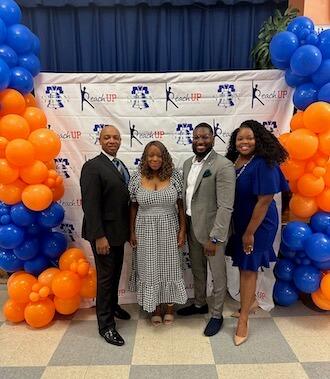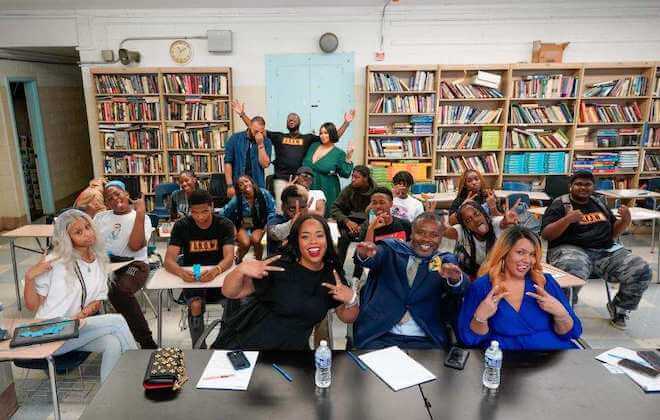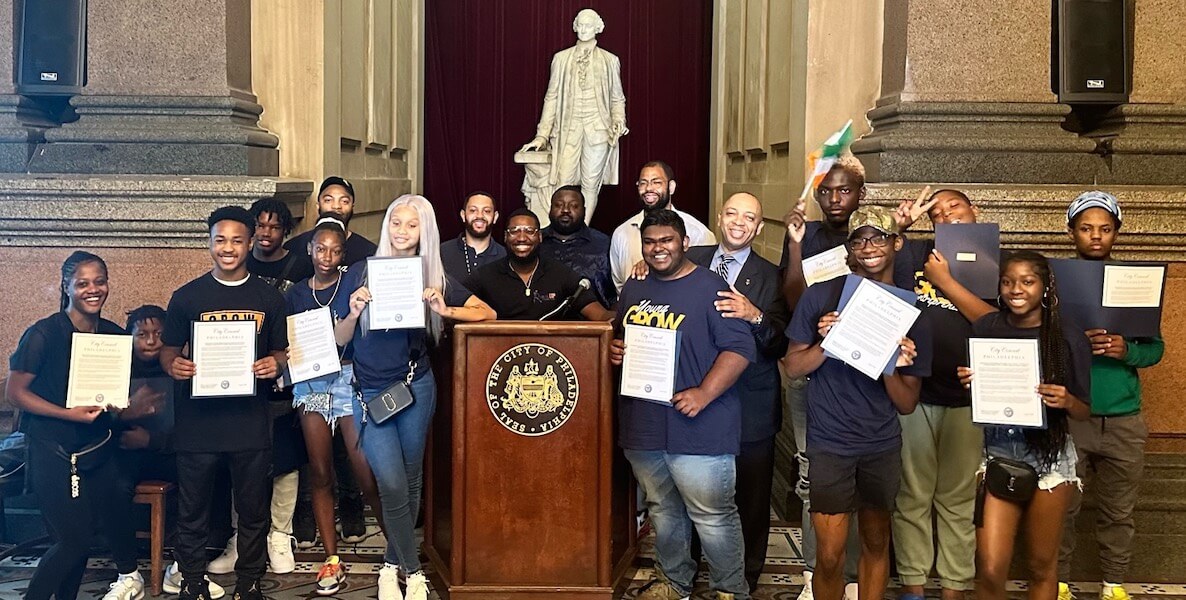On a hot August day, a couple weeks before the school year was set to get underway, two dozen high schoolers from around Philly gathered in the auditorium of Paul Robeson High School to share their plans for the future.
As a fan whirred in one corner, the students stood up and projected their voices to speak out aspirations of becoming music producers or CFOs. One girl dreamed about turning her side hustle doing hair and make-up for classmates into a full-fledged business.
Caleb Daniels, a rising senior at Robeson, shared that he’d like to study design in college and launch his own clothing line. Fashion has been in his life since he can remember, from age five, when he began helping his mom select her clothes and accessories, to today, when he designed, sewed and presented a dress for a capstone class.
“In school you have math and science, you have all those things, but like you’re never really taught how to navigate in the real world.” — Caleb Daniels
To that end, Daniels spent the week at GROW Academy, a new program that aims to teach Philadelphia public high school students about financial literacy, entrepreneurship, workforce and economic development, and civic engagement.
For four days, Daniels and his fellow students met with local business leaders to learn how to structure and market a company, and worked with a small group of advisors to develop a brand idea and pitch it to a team of judges. He stood before a room of adults, articulated his dream — and was taken seriously.
“In school you have math and science, you have all those things, but like you’re never really taught how to navigate in the real world,” says Daniels. “I can see this helping in the future.”
The nonprofit Reach Up Foundation organized the program, which ran from August 14-17. Over the next few years, Reach Up Foundation founder Rashon Howard plans to work with Richard Gordon IV, former Robeson principal and current School District of Philadelphia Assistant Superintendent, to spread GROW Academy throughout the city.
The seeds of GROW Academy
Howard worked for 14 years as a financial planner for Citizens Bank and later in his own practice, and by 2019 he’d become deeply familiar with the challenges people faced when trying to start their own businesses or build wealth. Customers would show up to open business accounts — only to find they didn’t qualify for loans or they hadn’t submitted proper forms with the City. Others didn’t have the paperwork in place to access and inherit funds after their loved ones passed away. Estate assets would end up being distributed improperly. These obstacles made it harder for families to build wealth.
Howard, who grew up in Oxford Circle, noticed that more often than not it was people of color who struggled to build wealth within our current financial systems. The Federal Reserve System data shows that only 16 percent of Black and 19 percent of Hispanic business owners get all the funding they need to start and maintain their businesses. In comparison, 35 percent of White applicants get all the funding they request when applying for business loans.

“Working at the bank, I learned that there was such a huge gap and resources for communities that look like mine,” Howard says. “It impacted me negatively going to work and seeing that people wanted to open up business accounts and didn’t have the right paperwork.”
Issues with financial intelligence went deeper than systemic challenges applying for business loans, however. Howard remembers working with an intern at his company who didn’t understand much of the information about loans, scholarships and interest rates in his student financial aid package. “He had a lot of questions and he was like, Man, it’d be great if we’d be able to start a program [to teach people things] like this,” Howard recalls.
So, that’s exactly what Howard decided to do. He worked with a focus group of high school and college-age students to figure out what gaps they had in their financial literacy education. He asked them what they wanted to know about budgeting, saving money, or starting a business. What did they wish school taught them? He started with his interns, then sought out other high school and college students. Students participated from Bloomsburg University, Cheyney University, La Salle University, Central High School, and Mastery Charter schools, among others.
He spent a year just talking with young people and learning what they wanted from their education about the financial world. Then, he worked with business leaders to create a curriculum that addressed those gaps and taught students the basics of starting their own businesses. He named the program GROW Academy — after the focus group rejected GROW “camp” for being too corny. GROW stands for “gaining realistic opportunities for wealth.”
Growing GROW
“GROW Academy is a place where students can learn, get resources, get excited, live their passion, and build their passion,” Howard says. “They want to learn how to start their own businesses and how to be successful, not just having it as a hobby, or something that they do on the side.”
He funded the program using a $7,500 activities grant from City Council, donations from corporate sponsors, and a donation from his own company, SHON LLC. By 2021, Howard was ready to launch GROW Academy. He just needed a school where he could host the event.
That’s where Gordon came in. Gordon has spent the last 10 years transforming Robeson from one the City planned to shutter in 2013 to a thriving institution with a 95 percent graduation rate.
“The students were tasked with presenting a plan where their business idea would have a community advocacy component. They all knocked it out of the park.” — Rashon Howard
Now, he sports a spate of accolades — Pennsylvania Principal of the year, National Principal of the Year, 2020 Philadelphia Citizen Integrity Icon, among others — in large part because he’s connected students with programs like Howard’s. Gordon has invested in mental health services, created partnerships that allow students to enroll in college-level classes at Penn, Drexel and the Community College of Philadelphia, and brought in a consultant who meets with students weekly to help them develop business plans and learn about opportunities for entering the workforce.
Gordon and Howard met as members of Black Phi Beta Sigma Fraternity, Inc. When Howard told Gordon about his idea for GROW Academy, “He said, ‘You’ve got to have it at my school,’” Howard recalls.
Gordon soon recruited 25 students to participate in the first iteration of the Academy, mostly from Robeson, but also from other public schools in the city, including Martin Luther King and Parkway West.
Nourishing entrepreneurial spirit
Over the course of four days, GROW Academy students attended sessions on basic financial literacy skills, like how to budget and manage their income or create savings accounts, and more involved topics, like how to invest, and build credit. These budding entrepreneurs learned about marketing, pitching to investors, and structuring a company.
Teaching them that week: Darly Santelises, founder of Assured Financial, and Marvin Barnhill, growth and strategy consultant with Accenture. In four sessions over three days, they imparted budgeting tips like the 50-30-20 savings rule — spend 50 percent of your income on needs, like rent and groceries; spend 30 percent towards wants; and put 20 percent in savings. Santelises and Barnhill also discussed the advantages and disadvantages of different corporate structures, like LLCs and corporations.
Students had time to work together on a pitch for a business idea that they presented during a Shark Tank-style event midweek.
They also heard from civil servants. Philadelphia City Councilmembers Katherine Gilmore Richardson and Jamie Gauthier spoke at the Academy’s opening event. On the program’s last day, participants toured City Hall.

“The students were very nervous at first to present but they did so well, and received great feedback from the judges,” Howard says. “They learned teamwork, relationship building, how to adjust and they worked on their public speaking skills during this project … Most importantly they were tasked with presenting a plan where their business idea would have a community advocacy component. They all knocked it out of the park.”
For Gordon, preparing students to become business owners and leaders — not just college students or future employees — should be a critical part of their high school experience. Typically, about half of the students at Robeson go on to college; the other half enter the workforce or enlist in the military. Many, like the students of GROW Academy, have dreams of turning their side hustles into local businesses. No matter where they’re headed after high school, Gordon wants students to believe they can pursue their dreams.
“A lot of times within traditional education, you’re only thinking of one mindset: either college or not,” Gordon says. “What a program such as GROW Academy does is it provides opportunities for students to get immediately involved in the workforce.”
The future of GROW Academy
Gordon and Howard hope to bring GROW Academy to more of Philly’s public schools over the next few years. Howard envisions a future where GROW Academy travels to different neighborhoods each summer, including Mt. Airy, North Philly, and West Oak Lane, where he spent summers with his aunt as a kid. He’d like each location to serve 50-100 students each year.
Howard hopes the program will have trickle down effects for some of the city’s other problems. Studies have found that offering students supervised, group activities, like sports teams, camps and educational programming can reduce gun violence amongst young people. He’s confident teaching financial literacy could help reduce the city’s poverty rate.

“When students know that people care about them — which I hope this program shows them with all of the small business owners, elected officials and community leaders that are coming in to pour into them — they’re gonna remember that for the rest of their life,” Howard says. “When they think about buying a ghost gun, when they think about doing a flash mob or throwing a rock in somebody’s car … maybe they won’t do that if they think: Man if I get caught, I might miss this opportunity to start my business or to intern with Councilmember Kathy Gilmore Richardson.”
The students, too, would like to see the program expand. Alex Lewis, a junior at Robeson who wants to start his own graphic design business, says GROW taught him “how to get out there and how to stay professional.”
In his new role as assistant superintendent, Gordon believes he can help Howard with this mission. He wants to see GROW Academy build out its corporate partnerships, to bring in Fortune 500 companies and small local businesses to teach students about different career paths, to offer them internship opportunities, and to help them prepare for their financial futures. To Gordon, the future of Philly’s students and the city as a whole is one in the same. If young people thrive, so too will our economy, our schools, our local governments.
“These students will be more involved with the economic development of Philadelphia for the next several years,” he says. “We can figure out how we can ensure that public education for the city of Philadelphia encompasses all students and raises opportunities for all students.”
![]() MORE ON MAKING EDUCATION WORK FOR OUR STUDENTS
MORE ON MAKING EDUCATION WORK FOR OUR STUDENTS
The graduates of GROW Academy, with Rashon Howard (center) and Richard Gordon IV.



